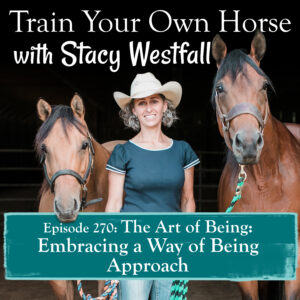Episode 270: The Art of Being: Embracing a Way of Being Approach
January 17, 2024/

In this episode, we will explore how to pursue a feeling state as a goal.
Listen in as Stacy coaches Lauren on how to pursue her theme of ‘having fun builds confidence.’
A way of being goal is an exploration of your experience of life. The direct goal becomes the exploration of your experience, the indirect goal becomes what you choose to do, for example, showing your horse.
This shift in focus transforms the show from a mere competition into a platform for self-study.
Topics include:
- 3 examples of making a ‘way of being’ goal measurable
- the danger of setting a ‘way of being goal’ and how to avoid it
- collecting mistakes
- self-esteem and self-confidence
- the power of individual choice in defining success
- the importance of viewing this goal across all areas of life, not just with horses
Steven Pressfield’s book, “The War of Art” is also recommended as an additional resource on the subject.
Click here to view the book on Amazon.
SUBSCRIBE TO THE PODCAST HERE:





YOURS FREE
WHY IS MY HORSE...?

